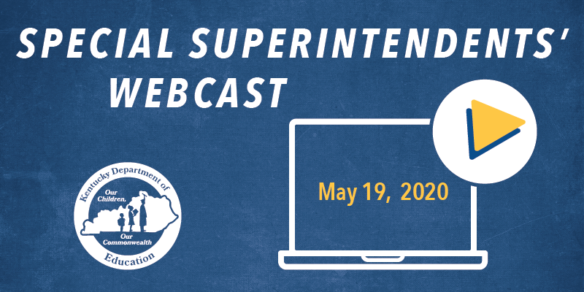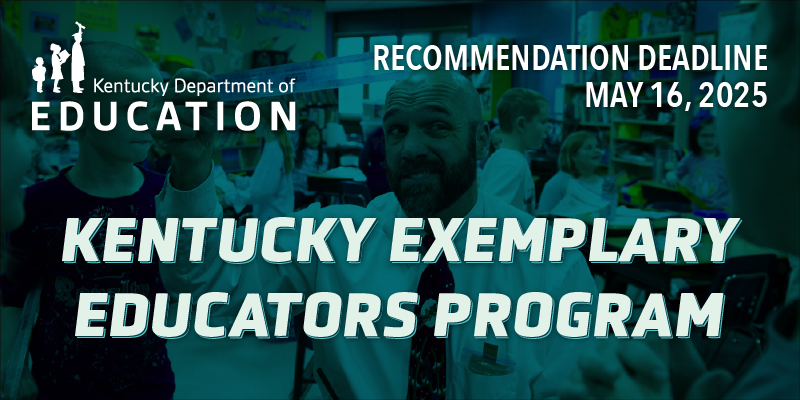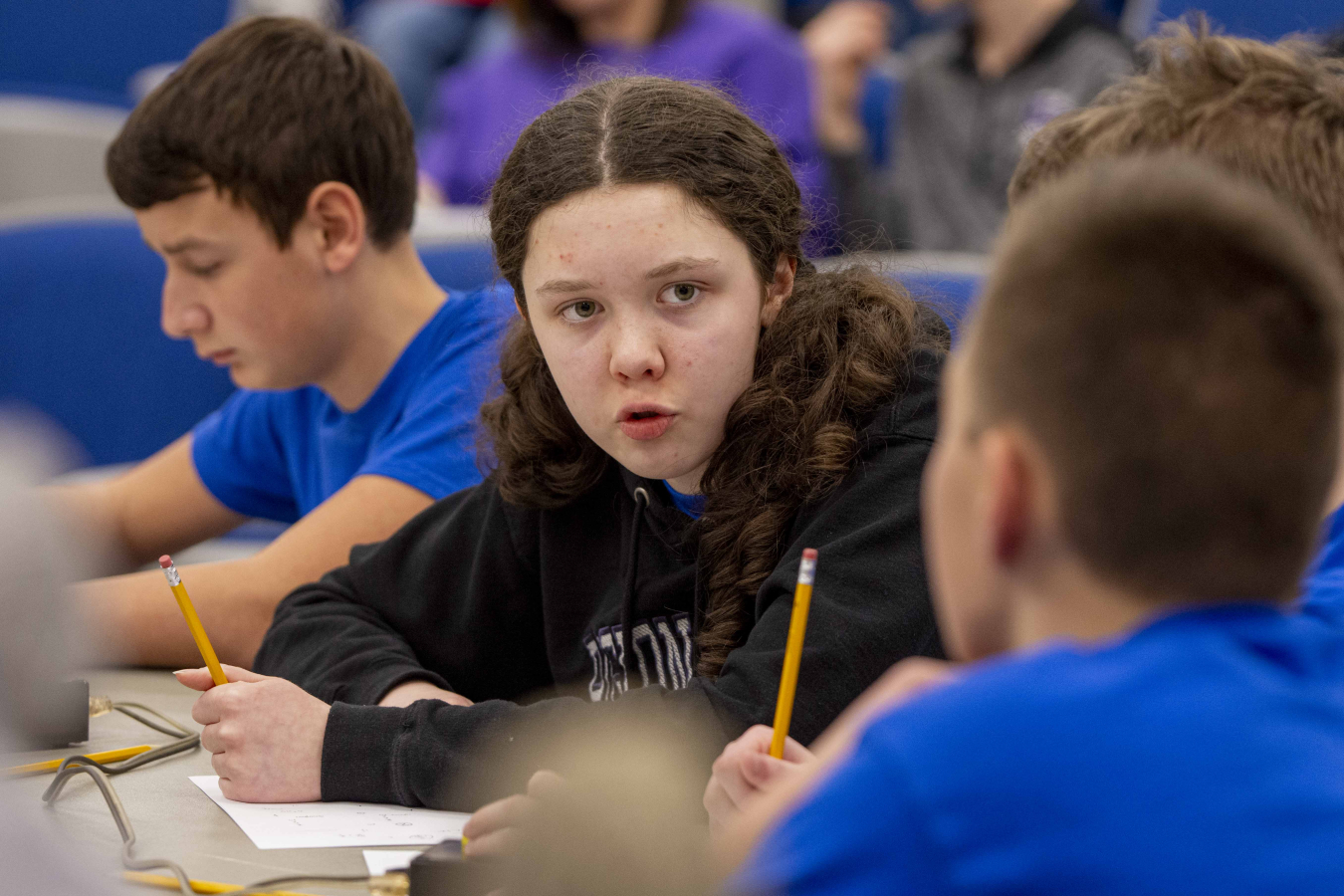
- Districts should be prepared for possible intermittent school building closures when determining which reopening method would best serve their communities.
- As districts begin working on plans for reopening, superintendents were told it is imperative to think about Kentucky’s most vulnerable students.
By Jacob Perkins
Jacob.perkins@education.ky.gov
Superintendents from Kentucky’s 172 school districts joined Kentucky Department of Education (KDE) leadership during a May 19 webcast as they dove into the reopening guidance document released by the department on May 15 that leads school leaders through a variety of questions to consider when planning how to start classes for the 2020-2021 school year.
At the recommendation of Gov. Andy Beshear, KDE is encouraging schools to prepare for three contingencies for the start of the school year: an early opening, a traditional opening and a late opening.
“If you want to open early and you are able to open early and meet the guidelines that are going to continue to come from the Department for Public Health, that is OK,” said Interim Education Commissioner Kevin C. Brown. “We also know that may not work for your community. … You just may not be able to logistically get ready to open in late July or early August. We understand that.”
Brown said the benefit of an earlier start date would be to get instructional days in before a potential spike in COVID-19 cases this fall.
“The governor wanted to make sure that districts could be thinking in various different terms because it is going to be a different school year,” he said. “The models were designed to get you thinking about those options. It’s OK, we’ve got your back if you want to open early. We’ve also got your back if you think it’s best in your district to open after Labor Day.”
Kelly Foster, associate commissioner from KDE’s Office of Continuous Improvement and Support, said that because of the uncertain nature of the COVID-19 pandemic, schools and districts should be prepared for sudden building closures or a rapid transition to extended periods of remote learning.
“That is something that your district reopening team needs to think about,” said Foster. “Do you have a plan in place if there is a rapid spike come this fall and you do have to go ahead and close in the middle of the fall semester?”
As the COVID-19 situation evolves and additional recommendations from Beshear and the Department for Public Health are issued during the summer, additional guidance documents will be produced by KDE to meet the needs of Kentucky’s schools and districts. More guidance and resources can be found on the KDE COVID-19 website.
Considerations for Reopening for Special Education
As districts begin working on plans for reopening, superintendents were told it is imperative to think about Kentucky’s most vulnerable students.
“If you haven’t already had conversations with your directors of special education … we would strongly encourage you to do that,” said KDE Associate Commissioner Gretta Hylton of the Office of Special Education and Early Learning. “As you work through the guidance and work through some of these questions, we want to ensure that students with disabilities have equity and access.”
Hylton stressed to the superintendents the importance of students with disabilities being afforded the same opportunities as students that do not.
When schools do begin to reopen, it may not be the least restrictive environment for Kentucky’s medically fragile students. Hylton listed questions for districts to consider regarding special education students during the reopening planning:
- How will the district ensure students with disabilities are provided equity and access?
- What did the district learn about providing specially designed instruction and conducting evaluations during the first round of the virus that it can use to improve programming during a resurgence?
- How will social distancing be accomplished in all special education environments?
- How can social distancing be accomplished for students who require 1:1 assistance and supervision?
- How will free appropriate public education (FAPE) be provided when the student is not physically present in the school building?
- How will the district support students who struggle with transition if intermittent scheduling has them switching between home and school daily?
- How will the district consider programming for medically fragile students?
“In order to avoid any discriminatory types of practices or inadvertently engage in exclusionary practices, I would strongly recommend that districts not take the approach that because a student has a disability, then he or she must come to school face-to-face or … must engage in remote learning,” said Hylton. “If those decisions are made due to a student’s unique needs then that should be done through the ARC and the ARC should determine what the least restrictive environment is for a student.”
CTE Dual Credit and Industry Certification Completion
KDE has partnered with the Kentucky Community and Technical College System (KCTCS) to provide an opportunity for Kentucky’s seniors to complete their career and technical education (CTE) lab-based dual credit.
KCTCS has offered its labs and instructors to Kentucky’s class of 2020 and will allow CTE students who still need to complete their dual credit lab-based classes the chance to do so. The goal is for these students to have their dual credit completed before June 30. Students will be provided with face masks if they do not have their own.
Dual credit coordinators at each of the 16 KCTCS colleges will reach out to high school teachers and principals to begin putting together a list of students who would like to participate.
KDE asks that students aged 18 or older notify a parent or guardian of their intent to take in-person classes on a KCTCS campus. Students aged 17 or below will need to have a waiver signed by a parent or guardian before they can participate.
“In order to do this, we want to make sure that the student wants to do this and there’s a willingness from the student and the parent,” said KDE Associate Commissioner David Horseman of the Office of Career and Technical Education and Student Transition
Underclassmen enrolled in a lab-based dual credit course within the 2019-2020 year that was not completed should be given an incomplete grade within Infinite Campus for the time being. When they return in the fall of 2020, these students will have until December 2020 to complete the lab-based coursework.
“Our priority here now is for this class of 2020 seniors, who we’ve talked about have really taken it on the chin this year,” said Horseman.
The Department for Medicaid Services (DMS) has advised that it will temporarily permit the completion of the 16 hours of supervised clinical experience required in the Medicaid Nurse Aid program to occur within a hospital or simulated clinical setting. Normally, these hours would be completed in a nursing home setting.
“We wanted to try and make sure there were opportunities for these folks because this gets kids right into jobs as soon as they graduate,” said Horseman.
Kentucky’s Tribute to the Class of 2020
KDE will honor its high school seniors with a one-hour program that will be streamed on the department’s special YouTube channel at 7 p.m. ET May 23.
“Kentucky’s Tribute to the Class of 2020,” is presented by KDE and the Kentucky Education and Workforce Development Cabinet and will be hosted by Lt. Gov. Jacqueline Coleman.
“This is Kentucky’s version of the event that was presented nationally,” said Brown. “My preference would have been that the national ceremony had a little bit more representation of Kentucky and its artists. This is our time to do that. … It is truly going to be a tribute to the students.”
With traditional high school graduations across the country canceled due to the COVID-19 pandemic, the goal of this tribute is to give the Commonwealth’s seniors a special, inspiring send-off they can enjoy with family, friends and others across the nation.
The event will feature commencement addresses from Beshear and several other elected and appointed education leaders across the state, as well as musical performances from Kentucky artists J.D. Shelburne, Linkin Bridge and the Kentucky State Choir.
In addition to the livestreamed event, KDE has created social media frames for Facebook and Twitter highlighting the accomplishments of both the Commonwealth’s students and their parents.
Update on Commissioner Search
KDE’s Interim Director of Communications Toni Konz Tatman informed the superintendents that the Kentucky Board of Education – with the assistance of Greenwood/Asher and Associates Inc. – is searching for nominations for the next commissioner of education.
As the chief executive officer for both the Board of Education and the Department of Education, the commissioner recommends and implements KBE policies and directs KDE in the management of the state’s 172 public school districts.
To nominate a candidate or apply, go to KDE’s 2020 Kentucky Education Commissioner Search webpage, which includes the job posting.
Individuals who wish to nominate a candidate should submit a letter of nomination, including contact information for the nominee to Greenwood/Asher and Associates Inc.
Nominations and applications are being taken until May 31.
MORE INFO …
- May 19 Special Superintendents’ Webcast
- Kentucky Department for Public Health’s COVID-19 webpage
- KDE’s COVID-19 webpage
- COVID-19 Hotline (800) 722-5725




Leave A Comment